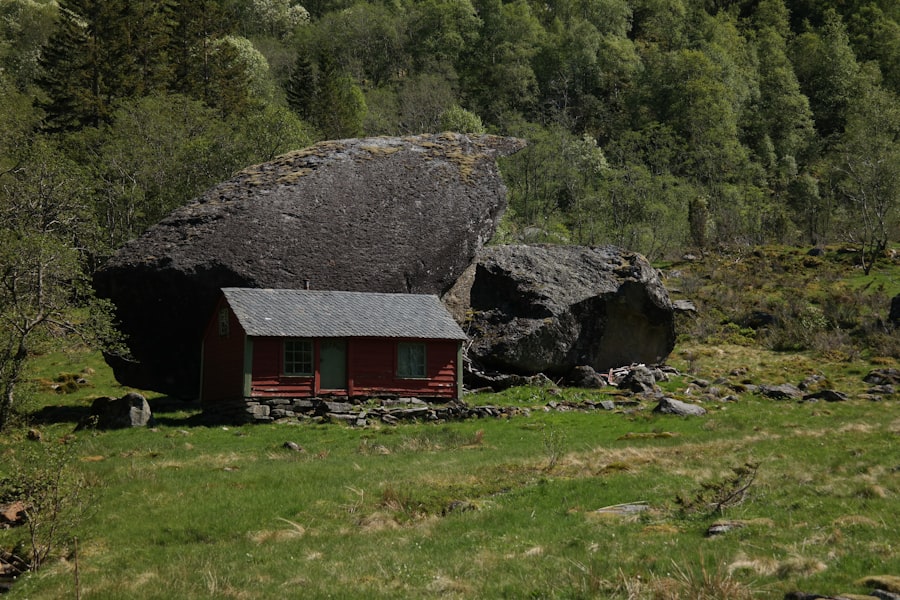The Norwegian housing market is a unique blend of traditional charm and modern innovation, reflecting the country’s rich cultural heritage and progressive outlook. With its stunning landscapes, vibrant cities, and high standard of living, Norway has become an attractive destination for both locals and expatriates alike. The housing market here is characterised by a variety of options, from quaint wooden cabins in the countryside to sleek apartments in bustling urban centres.
Understanding the nuances of this market is essential for anyone considering a move to Norway, whether for work, study, or a new lifestyle. In recent years, the Norwegian housing market has experienced fluctuations, influenced by factors such as economic conditions, interest rates, and demographic trends. The demand for housing has remained robust, particularly in major cities like Oslo, Bergen, and Stavanger.
However, the market can be competitive, with prices often reflecting the desirability of certain locations. As such, it is crucial for potential renters and buyers to familiarise themselves with the local landscape and the various options available to them. Book Your 1-Hour Relocation Strategy Session
Summary
- The Norwegian housing market is known for its stability and high quality of living, making it an attractive option for both renters and buyers.
- Renting a home in Norway offers flexibility and freedom from maintenance responsibilities, but it can be expensive and may not offer long-term stability.
- Buying a home in Norway provides long-term stability and potential for investment, but it requires a significant financial commitment and may limit flexibility.
- The cost of renting versus buying in Norway depends on factors such as location, property type, and current market conditions, making it essential to carefully consider individual circumstances.
- Legal and financial considerations for renting in Norway include understanding tenancy laws, rental contracts, and potential deposit requirements, while buying in Norway involves navigating mortgage options, property taxes, and legal processes.
Pros and cons of renting a home in Norway
Renting a home in Norway offers several advantages that can appeal to both newcomers and long-term residents. One of the most significant benefits is flexibility. Renting allows individuals to explore different neighbourhoods and cities without the long-term commitment that comes with purchasing a property.
This is particularly advantageous for expatriates who may be uncertain about their future plans or those who wish to experience various aspects of Norwegian life before settling down. Additionally, renting typically requires less upfront financial investment compared to buying a home, making it a more accessible option for many. However, renting also comes with its drawbacks.
One notable disadvantage is the lack of control over the property. Renters are often subject to the landlord’s rules and regulations, which can limit personalisation and modifications to the living space. Furthermore, rental prices in popular areas can be quite high, and tenants may face annual rent increases that can strain their budgets.
In some cases, finding a suitable rental property can be challenging due to high demand, particularly in urban centres where competition is fierce.
Pros and cons of buying a home in Norway

On the other hand, buying a home in Norway presents its own set of advantages and disadvantages. One of the primary benefits of homeownership is the potential for long-term financial investment. Property values in Norway have generally appreciated over time, making it a potentially lucrative venture for buyers.
Homeowners also enjoy greater autonomy over their living space, allowing them to make renovations and improvements as they see fit. This sense of stability can be particularly appealing for families or individuals looking to establish roots in a community. Conversely, purchasing a home in Norway can be a daunting process fraught with challenges.
The initial financial outlay required for a deposit and associated costs can be substantial, often requiring significant savings. Additionally, the process of buying property can be complex and time-consuming, involving legal considerations and negotiations that may be unfamiliar to first-time buyers. Moreover, homeowners are responsible for ongoing maintenance and repairs, which can add to the overall cost of ownership.
When weighing the decision between renting and buying in Norway, it is essential to consider the financial implications of each option. Renting typically involves monthly payments that cover not only the cost of the property but also utilities and maintenance fees in some cases. This arrangement can provide predictability in budgeting, as renters know their expenses upfront without worrying about unexpected repair costs.
However, over time, rental payments can accumulate significantly without building any equity. In contrast, while buying a home requires a larger initial investment, it can lead to long-term financial benefits. Homeowners build equity as property values increase, which can serve as an asset for future financial endeavours.
However, it is crucial to factor in additional costs associated with homeownership, such as property taxes, insurance, and maintenance expenses. A thorough analysis of both options will help individuals determine which path aligns best with their financial situation and long-term goals.
Legal and financial considerations for renting in Norway
Navigating the legal landscape of renting in Norway requires an understanding of tenant rights and responsibilities. The Norwegian Tenancy Act governs rental agreements and provides protections for both landlords and tenants. It is essential for renters to familiarise themselves with these regulations to ensure they are treated fairly throughout their tenancy.
For instance, landlords are required to provide a written rental agreement that outlines the terms of the lease, including rent amount, duration, and any specific conditions. Financially, renters should be prepared for certain costs beyond monthly rent payments. A security deposit is typically required upfront, often equivalent to three months’ rent.
Additionally, renters should consider potential increases in rent over time and budget accordingly. Understanding these legal and financial aspects will empower renters to make informed decisions and protect their interests throughout their tenancy.
Legal and financial considerations for buying in Norway
For those considering purchasing property in Norway, it is vital to grasp the legal framework surrounding real estate transactions. The process typically involves several steps, including securing financing through a mortgage lender and conducting due diligence on the property itself. Buyers should engage a qualified real estate agent who can guide them through the complexities of the market and assist with negotiations.
Financially, prospective buyers must be aware of various costs associated with purchasing a home beyond the purchase price itself. These may include stamp duty (documented as “document fee”), registration fees, and legal costs related to property transfer. Additionally, obtaining a mortgage requires careful consideration of interest rates and repayment terms.
A thorough understanding of these legal and financial considerations will help buyers navigate the process more effectively.
Cultural and lifestyle factors to consider when deciding to rent or buy in Norway

Cultural factors play a significant role in shaping housing decisions in Norway. The Norwegian lifestyle often emphasises work-life balance and outdoor activities, which can influence preferences for certain types of properties or locations. For instance, individuals who value proximity to nature may prefer homes in rural areas or near fjords, while those who thrive in urban environments may seek apartments in city centres.
Moreover, social norms surrounding homeownership differ from those in other countries. In Norway, there is less societal pressure to own property compared to some cultures where homeownership is seen as a status symbol. This cultural perspective allows individuals more freedom to choose between renting or buying based on personal circumstances rather than societal expectations.
Availability and variety of rental properties in Norway
The availability of rental properties in Norway varies significantly depending on location and demand. In major cities like Oslo and Bergen, there is a diverse range of rental options available, from modern apartments to traditional homes. However, competition for desirable properties can be intense, leading to higher prices and quicker turnover rates.
It is not uncommon for rental listings to receive multiple applications within days of being posted. In contrast, rural areas may offer fewer rental options but often provide more spacious properties at lower prices. Those seeking a quieter lifestyle may find charming cabins or houses available for rent amidst stunning natural landscapes.
Regardless of location preferences, potential renters should be prepared to act quickly when they find a suitable property due to the competitive nature of the market.
Availability and variety of properties for sale in Norway
The market for properties for sale in Norway is equally diverse but varies significantly by region. Urban areas tend to have a higher concentration of apartments and townhouses catering to young professionals and families alike. In contrast, rural regions often feature larger homes with expansive land suitable for those seeking tranquillity away from city life.
Buyers should also consider the type of property they wish to purchase—whether it be a newly built flat or an older house with character—and how this aligns with their lifestyle preferences. The availability of properties can fluctuate based on economic conditions and seasonal trends; thus, staying informed about market developments is crucial for prospective buyers.
Tips for navigating the Norwegian housing market as a renter
For those looking to rent in Norway, several strategies can enhance your chances of securing a desirable property. Firstly, it is advisable to start your search early—ideally several months before your intended move-in date—to allow ample time for exploration and decision-making. Utilising online platforms dedicated to rental listings can streamline this process by providing access to a wide range of options.
Additionally, being prepared with necessary documentation such as proof of income or references from previous landlords can strengthen your application when competing against other potential tenants. Finally, maintaining open communication with landlords or property managers throughout the application process can demonstrate your reliability as a tenant.
Tips for navigating the Norwegian housing market as a buyer
Navigating the Norwegian housing market as a buyer requires careful planning and research. Engaging a knowledgeable real estate agent can provide invaluable insights into local market trends and help identify properties that meet your criteria. It is also essential to secure pre-approval for financing before beginning your search; this will give you a clear understanding of your budget and strengthen your position when making an offer.
Furthermore, conducting thorough inspections of potential properties is crucial to avoid unexpected issues down the line. Buyers should also be prepared for negotiations; understanding current market conditions will empower you to make informed offers that reflect fair value while remaining competitive. In conclusion, whether you choose to rent or buy in Norway depends on various factors including personal circumstances, financial considerations, and lifestyle preferences.
To navigate this complex landscape effectively, consider scheduling a One-Hour Strategy Session with the Norway Relocation Group. Their expertise can provide tailored guidance specific to your needs—helping you make informed decisions that align with your goals in this beautiful Scandinavian country.

